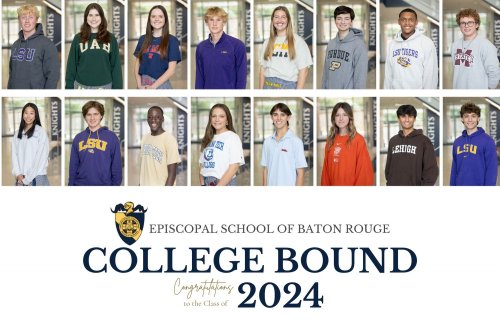- Discover Episcopal
- Admission
- Our Program
- Athletics
- Arts
- Spirituality
- Student Life
- Support Episcopal
- Alumni
- Parent Support
- Knightly News
- Contact Us
- Calendar
- School Store
- Lunch Menu
- Summer Camps
« Back
Children Lacking Empathy? Study Shows Reading May Help
December 6th, 2017

A google search of the word “empathy” reveals over a billion results. The term, which means the ability to understand and share the feelings of another, has become somewhat of a buzzword. Research by one of Episcopal’s own has shown that the concept is much more than just noise.
Martha Guarisco, a sixth grade English teacher with a love for young adult fiction, didn’t set out to study empathy and how a book can help foster it. It was a passion for a transformative book and being at the right place at the right time that led to a two year study with the results eventually being published in three journals and cited by many others.
In 2014 Martha attended a Youth Adult Literacy Conference where she participated in a break out session on how the Harry Potter series has boosted empathy among young adult readers (Harry Potter is another of Martha’s loves). Afterwards, she approached the guest speaker – Dr. Louise Freeman – to discuss how Martha could replicate empathy research involving a study of the novel “Wonder” by Raquel J. Palacio. That conversation sparked a study that has yielded insightful results.
Dr. Freeman advised Martha on how to measure the students’ empathy in the areas of perspective taking, emotional transport and theory of mind. Martha was amazed to discover that many of the psychological concepts correlated with common educational terms. For example, perspective taking translates to point of view in literature. Psychologists refer to a person’s tendency to transport into a fictional world as the Fantasy Scale. In English class this would be considered the reader’s engagement with the story. The psychological term “sleeper effect,” meaning it takes time for something to happen, might be called deep learning in education. Making these connections helped Martha realize that empathy is taught in the classroom without teachers even realizing it.

For the study, students took part in scenario tests and self-reporting on how a situation made them feel. They also took the eye test in which they were asked to look at someone’s eyes and guess how that person felt at the time. After the initial testing was complete, the students read the book “Wonder”. Martha taught the book as she would any other, including art projects for visualizing aspects of the book and even bringing in school counselor Alicia Kelly to discuss empathy in more detail. Afterwards students repeated the tests to compare the impact.
 Martha says the results were exciting. After studying the novel students were shown to have positive changes in regards to perspective taking. This means students were better able to understand someone else’s perspective simply by reading a novel. With such success after the first year Martha conducted the same research a second year with a few changes. She allowed students to choose between Palacio’s “Wonder” and “Crossover” by Kwame Alexander. She also allowed some students to read the novels on an electronic reader while others read traditional books.
Martha says the results were exciting. After studying the novel students were shown to have positive changes in regards to perspective taking. This means students were better able to understand someone else’s perspective simply by reading a novel. With such success after the first year Martha conducted the same research a second year with a few changes. She allowed students to choose between Palacio’s “Wonder” and “Crossover” by Kwame Alexander. She also allowed some students to read the novels on an electronic reader while others read traditional books.
 The second year results were equally as enlightening. Again the students showed marked increases in perspective taking and thus, empathy. But what Martha found even more interesting was that while both boys and girls were excited to read the books electronically, the results showed their overall comprehension decreased and there was less empathetic growth.
The second year results were equally as enlightening. Again the students showed marked increases in perspective taking and thus, empathy. But what Martha found even more interesting was that while both boys and girls were excited to read the books electronically, the results showed their overall comprehension decreased and there was less empathetic growth.
As an English teacher and parent all of this resonates with Martha on several levels. She says the experience confirms the significant responsibility adults have not only in suggesting books for young readers, but also in recommending reading formats. She says the research has certainly made her more cognizant in choosing books for her classroom library. She is sensitive to the fact that every child needs to see a positive reflection of themselves in a book, but that they also need to see a wide range of people different from themselves. Thoughtfully selecting these books allows students to have more intentional conversations about issues such as race, class and gender.
How do we keep this focus on empathy so that it’s not just a passing fad or buzzword? Martha says the English teacher inside her says keep reading! She says exposure to great stories and experiences will create an awareness of the world’s diversity and the variety of perspectives that exist.
Episcopal educators are doing amazing things inside and outside of the classroom. Martha’s research is just one example of the expertise these professionals provide. Check out Martha’s research here.
Looking for additional reads to encourage empathy? Here are a few of Martha’s suggestions:
- “Out of My Mind” by Sharon Draper
- “El Deafo” by Cece Bell
- “Inside Out & Back Again” by Thanhha Lai
- “A Little Piece of Ground” by Elizabeth Laird
The Episcopal School of Baton Rouge 2024-2025 application is now available! For more information on the application process, to schedule a tour, or learn more about the private school, contact us at [email protected] or 225-755-2685.
Posted in the categories All, Middle School.
Other articles to consider
 May16Episcopal Welcomes Father Patrick Edwards as New Head Chaplain
May16Episcopal Welcomes Father Patrick Edwards as New Head ChaplainLearn more about new Episcopal Head Chaplain Father Patrick Edwards.
See Details May16Lower School Happenings - May 2024
May16Lower School Happenings - May 2024There's excitement and joy in Lower School as students wrap up the school year. Check out the latest projects.
See Details May16Future Business Leaders Benefit from Spring Lessons/Community Support
May16Future Business Leaders Benefit from Spring Lessons/Community SupportEpiscopal students participated in two real-world learning experiences – the What’s Your Bright Idea? Episcopal Pitch Contest and the annual Burkenroad Reports Investment Conference.
See Details May8College Announcements 5.10.24
May8College Announcements 5.10.24Please join us in congratulating members of the Class of 2024 as they announce their college enrollment decisions.
See Details
Categories
- All
- Admission
- Athletics
- College Bound 2019
- College Bound 2020
- College Bound 2021
- College Bound 2022
- College Bound 2023
- College Bound 2024
- Counselors Corner
- Episcopal Alumni
- Giving
- Head Of School
- Lower School
- Middle School
- Spirituality And Service
- Student Work
- The Teachers' Lounge
- Upper School
- Visual And Performing Arts
Recent Articles
- 05/16/24Episcopal Welcomes Father Patrick Edwards as New Head Chaplain
- 05/16/24Lower School Happenings - May 2024
- 05/16/24Future Business Leaders Benefit from Spring Lessons/Community Support
- 05/8/24College Announcements 5.10.24
- 05/7/24Episcopal's Addisyn Botos Will Continue Track & Field at Southern Miss
- 05/7/24Spring Sports Success!
- 05/3/24Episcopal Audiences Wowed by "The Children of Willesden Lane"
- 05/3/24Service Learning & Community Impact Students Share Thoughts on Earth Day
- 05/2/242024 Mums of Alums Luncheon Draws Large Crowd of Supportive Mums
- 05/2/24College Announcements 5.3.24











